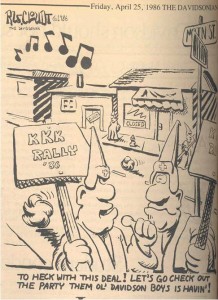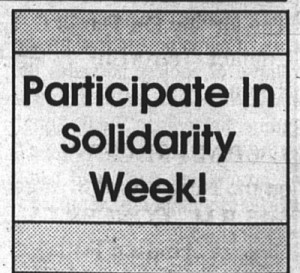
When the Ku Klux Klan staged a march through the middle of the Town of Davidson in 1986, the stores in town shut down and the students gathered together in a day of food and fun on the grass between Vail Commons and Fraternity Row. This first gathering was known as the “Solidarity Gathering” as students fought the Klan in the best way possible: complete apathy, denying this racist organization the very attention they so craved. [“Racism”]
Inspired by this demonstration of unity from both the townspeople and the students, the Student Government Association founded the Solidarity Committee and irrevocably tapped its roots into the unity within the College that was produced by the racial tensions of the late 1980s. [Helms]
While this solidarity inspired both the campus and the Student Government Association, full integration of minority students into Davidson life during the late 1980s and early 1990s was still incomplete in many ways. These racial issues on Davidson’s campus were publicized in Charlotte newspapers. One article detailed the difficulties of a black student who felt the injustice of discrimination at the hands of campus police while playing basketball with four of his Caucasian friends. This young man was Anthony Foxx, who would later become the mayor of Charlotte, as he said, “Racism hasn’t gone away…We’ve pinpointed the problem. The problem is attitude.” His comment reveals the challenging racial situation at Davidson during this time. [O’Brien]
Seeing these difficulties of minorities, and particularly African-Americans, on Davidson’s campus, the SGA felt clear responsibility in welcoming diversity into the Davidson Experience. The SGA’s forward-looking policy was stated best by SGA President Tripp Helms when he said, “The minority situation at Davidson is one of the most important issues the SGA will ever address. The quality of the…Davidson experience…now and in the future can be greatly affected by our efforts.” [Helms]
In 1989, the Student Executive Committee of the SGA moved to solidify the principles and purpose of the Solidarity Committee into a body of students dedicated to achieving lasting changes in Davidson’s social atmosphere. The specific aims of the Solidarity Committee included investigating problems within the minority experience at Davidson and then implementing solutions to the problems they managed to identify.
In its beginning stages, the committee predicted that solutions would come in the form of campus-wide activities aimed at promoting cohesion as well as awareness. These activities included interviews, open forums, sponsorship of campus wide events, and discussions with the Board of Trustees through the SGA President. [Helms]
Once the Solidarity Committee established itself during 1989-90, the year 1991 brought them into a position to create larger events, programs, and initiatives. That year, the committee established a Martin Luther King Prayer Vigil and Program as well as the “Solidarity Week” initiative for which they are best remembered. The first “Solidarity Week,” which spanned the Monday through Thursday of the week leading up to the campus-wide Spring Frolics, included a “Sexuality Day,” a “Hispanic Day,” an “Afro- American Day,” and an “International Day.” [“Solidarity Week Advertisement”] With discussions about rape awareness, guest speakers from Guatemala, world- renowned storytellers from Africa, and a meal to promote hunger awareness, the Solidarity Committee managed to found and organize an event that encompassed multitudinous interests in diversity and cultural awareness.

During the elections for a new SGA president and vice-president in 1991, each candidate mentioned the Solidarity Committee and “Solidarity Week.” [Thompson] While the prominence of the Solidarity Committee in this discussion certainly testifies to the committee’s success and relevance, it also raises new questions.
In one candidate’s speech, she discussed her obviously deep involvement with the Solidarity Committee and her hopes to improve it. Disappointed by the lackluster turnout that the first Martin Luther King, Jr. prayer vigil produced, Cammie Covington laid out her own ideas for placing greater emphasis on the Solidarity Committee and its initiatives. [Thompson]
The Solidarity Committee continued its work from 1991-95, pruning some practices while reinforcing and fixing others. However, the question raised by Cammie Covington about the committee’s overall practical success remains both a germane and potentially harmful issue for its legacy.
The Solidarity Committee’s true legacy lies in its role as a precursor to later campus initiatives aimed at cultural and racial awareness and acceptance. Each initiative of each of the days of the first 1991 Solidarity Week is now served by a new campus organization established because of the Solidarity Committee. Furthermore, the principles and initiatives of the Solidarity Committee have been incorporated into a community service arm of the SGA known as the UCA, or United Community Action. Between inspiring and establishing individual community awareness efforts as well as the community service arm of the SGA, the UCA, the Solidarity Committee maintains the proud legacy of being a far-reaching trailblazer and catalyst for later campus organizations for change.
Works Cited
Advisory Committee to the President on Minorities. Interim Report. 23 February 1989. RG 6/144. Student Government Association Records. Committees- Solidarity. Davidson College Archives, Davidson, NC.
Committee to Monitor the Black Student Coalition’s Goals. Statement of Purpose and Resolution. 18 October 1989. RG 6/144. Student Government Association
Records. Committees- Solidarity. Davidson College Archives, Davidson, NC.
Helms, Tripp. Letter to Doug Hicks, et. al. 14 September 1989. RG 6/144. Student Government Association Records. Committees- Solidarity. Davidson College
Archives, Davidson, NC.
Kelley, Rob. “’Taking Back the Night’ Raises Awareness.” The Davidsonian. Vol. 82. No. 22. 15 April 1991.
O’Brien, Kevin. “Black Students at Davidson Frustrated.” The Charlotte Observer. RG 6/144. Student Government Association Records. Committees- Solidarity.
Davidson College Archives, Davidson, NC.
“Racism.” The Davidsonian. Vol. 75. No. 21. 25 April 1986.
Thompson, David, ed. “SGA Candidates Discuss Issues with The Davidsonian.” The Davidsonian. Vol. 82. No. 20. 18 February 1991.
Images
“Ku Klux Klan Cartoon.” The Davidsonian. Vol. 75. No. 21. 25 April 1986.
“Solidarity Week Advertisement.” The Davidsonian. Vol. 82. No. 21. 8 April 1992.
Author: Nicholas Norris
Date: 21 April 2011
Cite as: Norris, Nicholas. “Solidarity Committee” Davidson Encyclopedia April 2011 <https://davidsonarchivesandspecialcollections.org/archives/encyclopedia/solidarity-committee-sga/>
Related Entries
Student Government Association and Service

Sorry, comments are closed for this post.